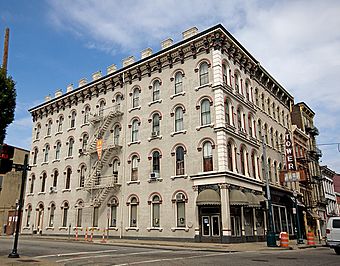Theodore Krumberg Building facts for kids
Quick facts for kids |
|
|
Theodore Krumberg Building
|
|
|
U.S. Historic district
Contributing property |
|

Front and southern side of the building
|
|
| Location | 1201 Main St., Cincinnati, Ohio |
|---|---|
| Area | less than one acre |
| Built | 1871 |
| Architect | Theodore Krumberg |
| Architectural style | Italianate |
| Part of | Over-the-Rhine Historic District (ID83001985) |
| NRHP reference No. | 82001467 |
| Added to NRHP | December 17, 1982 |
The Theodore Krumberg Building is an old and important building in Cincinnati, Ohio. It was built a long time ago, in 1871. This building is special because of its unique style, called Italianate. It's also very big and stands out at the corner of Main and Twelfth Streets in the Over-the-Rhine neighborhood.
History of the Building
Theodore Krumberg built this amazing structure in the early 1870s. He wanted a place for his business, which was a dry goods store. Dry goods are things like fabrics, clothing, and other items that are not food. Part of the building was used for selling things, and other parts were used as a warehouse to store his products.
What Makes It Special
Theodore Krumberg chose many fancy details for his building. The main walls are made of strong brick. But many important parts, like the tops of the windows (called lintels) and a decorative edge at the top (a cornice), are made from smooth sandstone. There are also special supports called brackets under the window sills. Some small details are even made of shiny marble or strong iron.
The Krumberg Building is four stories tall. It has a very wide front, with many sections for windows and doors (these sections are called bays). Everywhere you look on the outside, you can see the beautiful Italianate style. This style often includes tall windows, decorative cornices, and sometimes balconies.
A Protected Landmark
In 1982, the Theodore Krumberg Building was added to the National Register of Historic Places. This means it's recognized as an important historical site because of its special architecture.
Just one year later, most of the Over-the-Rhine area was also added to the Register as a historic district. The Krumberg Building was one of hundreds of buildings that helped make the whole area special. These buildings are called "contributing properties" because they add to the history and look of the district.



